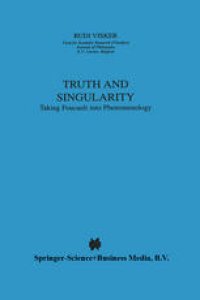
Ebook: Truth and Singularity: Taking Foucault into Phenomenology
Author: Rudi Visker (auth.)
- Tags: Philosophy, Ontology, Ethics, Philosophy of Man, Modern Philosophy
- Series: Phaenomenologica 155
- Year: 1999
- Publisher: Springer Netherlands
- Edition: 1
- Language: English
- pdf
The aim of these essays is to disentangle us from the opposition between universalism and relativism in which so many of the debates in recent contemporary philosophy have found themselves caught. Unsurprisingly so, for, as this volume shows, what is in fact returning in these discussions and manoeuvring them into a pre-set course is the very ambiguity which they seek to repress. The name of that ambiguity is, of course, ‘the subject', but a subject whose finitude seems to have left it with a burden which it did not wait for philosophy to take over. Racism, ethnocentrism and multiculturalism owe their dynamics to a tension at the heart of the subjectivity of a subject which not only lost its place at the centre, but also found its place outside of that centre to be less than comfortable. As the collision between phenomenology (Heidegger, Merleau-Ponty, Sartre, Levinas) and post-structuralism (Foucault, Lacan, Derrida) enacted in this volume forces one to conclude, such a decentred subject is all but dead. It is attached to 'something' to which it does not find access and from which it cannot rid itself, because it is that to which it owes its singularity.
The inflation of particularisms in our contemporary societies betrays an attempt to appropriate that ‘something' and thus to provide man with the roots he misses. But no less one-sided are the attempts of those who in response to this try to locate man's 'deepest essence' (Levinas) in an uprootedness 'beyond' or 'before' any such rootedness. Particularism and its critics are each in their own way recentring a decentred subjectivity characterized for one and the same reason by both 'too many' and 'too few' roots.
Such is human dignity: what makes us irreplaceable is at once that from which we suffer and would like to be relieved of. It is that metaphysical unrest in man which obliquely manifests itself in the problem of 'difference' with which our societies find themselves confronted and in which they conspicuously can only recognize an ethical—political dimension. What is thus excluded is that part of the subject which does not respond to others because it does not even respond to the subject itself. An exclusion in which one can suspect the legacy of a modernity prone to horizontalize a transcendence which it found unoccupied. Paradoxical as it may seem, something of a verticality in man that refuses to bow to such a horizontalization—and to what one calls 'the world'—seems to have been preserved in the stubbornness with which relativism, if one is to believe its critics, keeps refuting itself. We propose to call that something 'transdescendence'.